- Learning time
- 30 minutes
- First play time
- 90 minutes
Santiago de Cuba
Designed by: Michael Rieneck
In Santiago de Cuba the players represent rule-bending trade brokers, wheeling and dealing their way around the city in order to cash in at the docks: there, ships await with demand for Cuba’s produce (fruit, sugar, tobacco, rum, cigars). Fill the orders to score points – when the seventh ship sails away, most points wins!
The small-ish board allows for a randomized set-up: characters are placed along the road in town and buildings along the outside of the board. Players begin with a little cash, a couple of points and one each of the basic goods – fruit, sugar and tobacco. Everyone keeps their stuff hidden behind their own player screen. At the start of the round coloured dice are rolled to determine which goods the ship sitting in the docks is demanding, then play begins.
Flying somewhat in the face of traditional business conventions, the players’ industrialists travel together in a small car along the road. On your turn you can move the car to the next location for free, or pay cash to move it further along the road. Wherever you stop, two things happen. First, you take the benefit of the character in the location you stopped at. This might be further supplies of goods, a bit of cash, some cargo (these function as jokers at the docks, where they can be sold as any good), a couple of points, a minor theft from your opponents (they must give you a point, a coin or one good) or even the temporary absence of another character somewhere along the route.
Having taken that action, you now look at the coloured flower on the character card – each one relates to a trio of buildings along the edge of the board. If it isn’t occupied by another player, you can now activate one of these buildings too. Like the characters they are pretty straightforward: trading resources, picking up cash, changing the value of goods about to be sold at the docks, or even vanquishing demand on a particular good by turning the matching coloured die to zero. This last option might sound like a poor choice for a trader, but if the ship is demanding cigars and you know the other players have some hidden behind their screens, there is a cold, capitalist logic to it.
At the end of the road is a space for the docks. If someone chooses to stop here, all players have the opportunity to sell goods to the waiting ship – but crucially, one type of good at a time, in turn order. Going back to our imaginary cigar scenario above, if you know everyone has cigars but only you have tobacco, the logical thing to do would be sell cigars first… (imagine an evilly grinning emoticon here). If the ship’s demands are fully met, it sets sail and a new round begins with a new ship arriving. If the ship is still waiting for goods then this round continues, with the car returning to the start of the road – as it does if it whizzes past the docks entirely. In either scenario, whatever goods the ship is waiting on now increase in value – meaning more potential points for the lucky (or canny) player who sells there next time…
The guru's verdict
-
Take That!
Take That!
There's a feisty seam running through Santiago de Cuba - the thief steals from you, players dry up demand for your precious goods, or jump ahead of you in the queue to sell. Not mentioned above is the opportunity to take ownership of a building; when other players visit there it scores you a point. Not much, but the potential difference between narrow defeat or glorious victory - or as much glory as there is to be had in this surprisingly dark and dirty undertaking.
-
Fidget Factor!
Fidget Factor!
Pauses for consideration aren't uncommon, but not enough to make the game drag to a halt.
-
Brain Burn!
Brain Burn!
There's a memory aspect here, because remembering what your opponents have behind their screens can be key. Making sure you have a bit of cash at all times gives you the luxury of extra movement along the road - and most of all perhaps is how each character combines with each building - it's possible to occupy a building you can't afford to actually use (trading tobacco, say, when you don't have any) and doing this too many times is an unlikely route to victory.
-
Again Again!
Again Again!
The randomised set-up and the dice-rolling mean each game works slightly differently to the last, but the player choices make a big difference too.

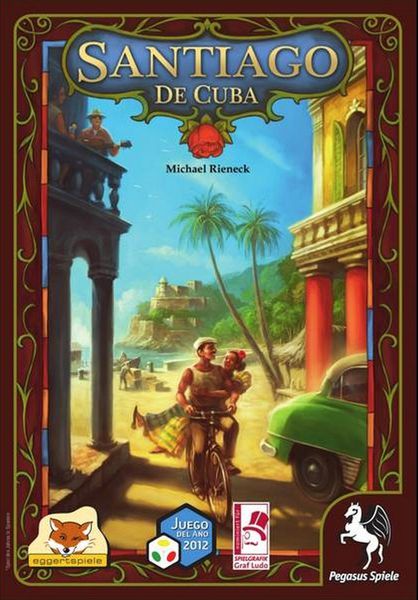
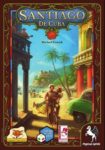
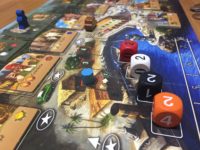

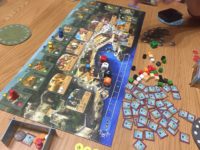


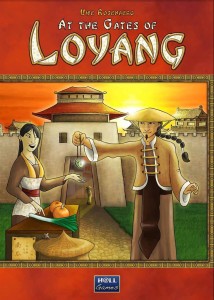
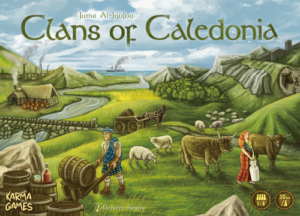
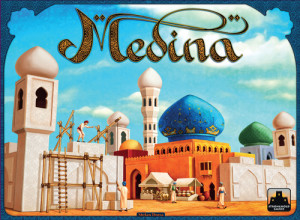

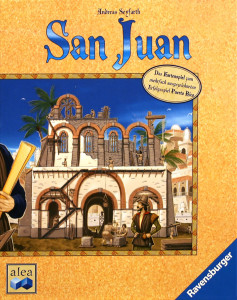
Sam says
Sadly out of print at time of writing, this is a clever little thing that packs a punch: there are many, many games involving trading but they are often either super-simple (Bohnanza) or rather complex (Brass). Santiago de Cuba hits a sweet spot in that it allows for strategy (sell often and low, try to hike prices and sell high, or play in a Darwin-esque reactive fashion) tactics (you definitely need to watch what the other players are up to) and some spicy interaction that means tender souls might want to give this one a miss. The heart of it all - move the car, activate character and building - makes the game very accessible, but it's not as innocent as it first appears. Players might all share a cab around town, but they're holding knives behind their backs...